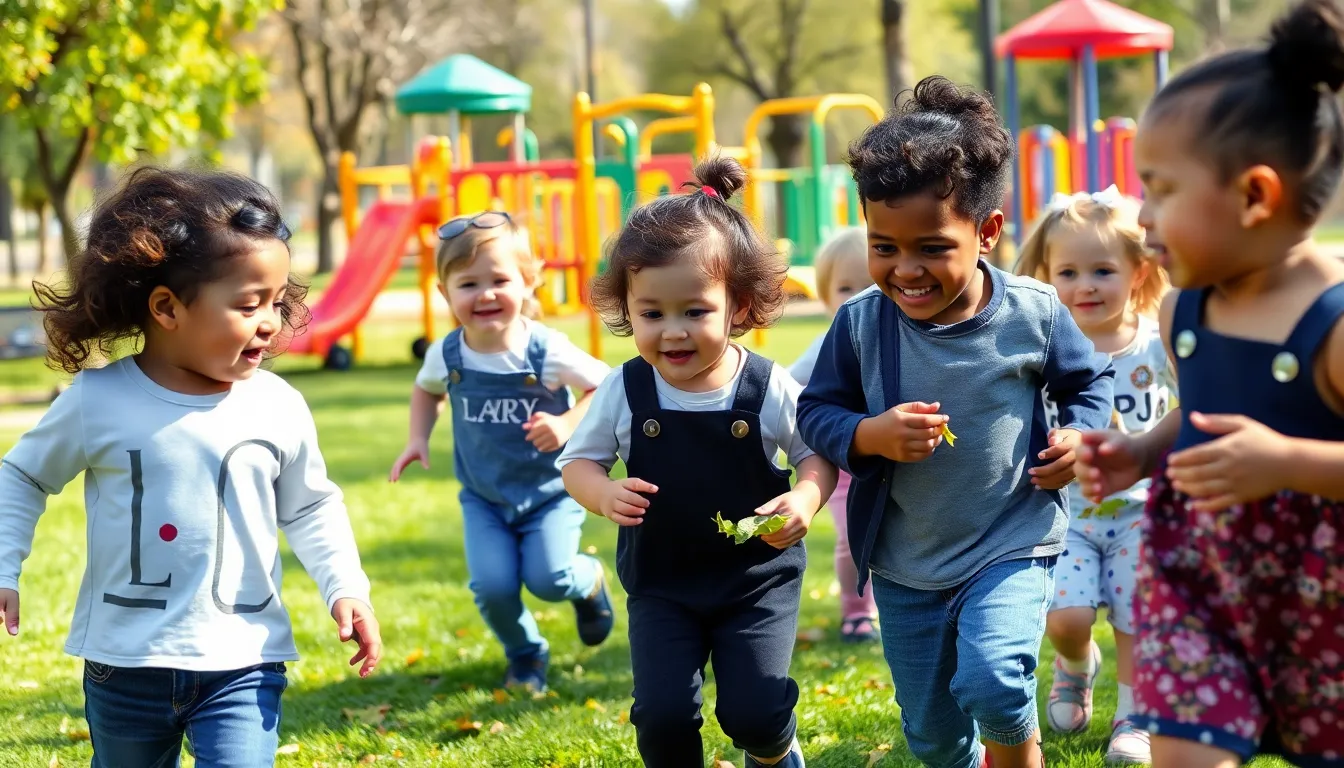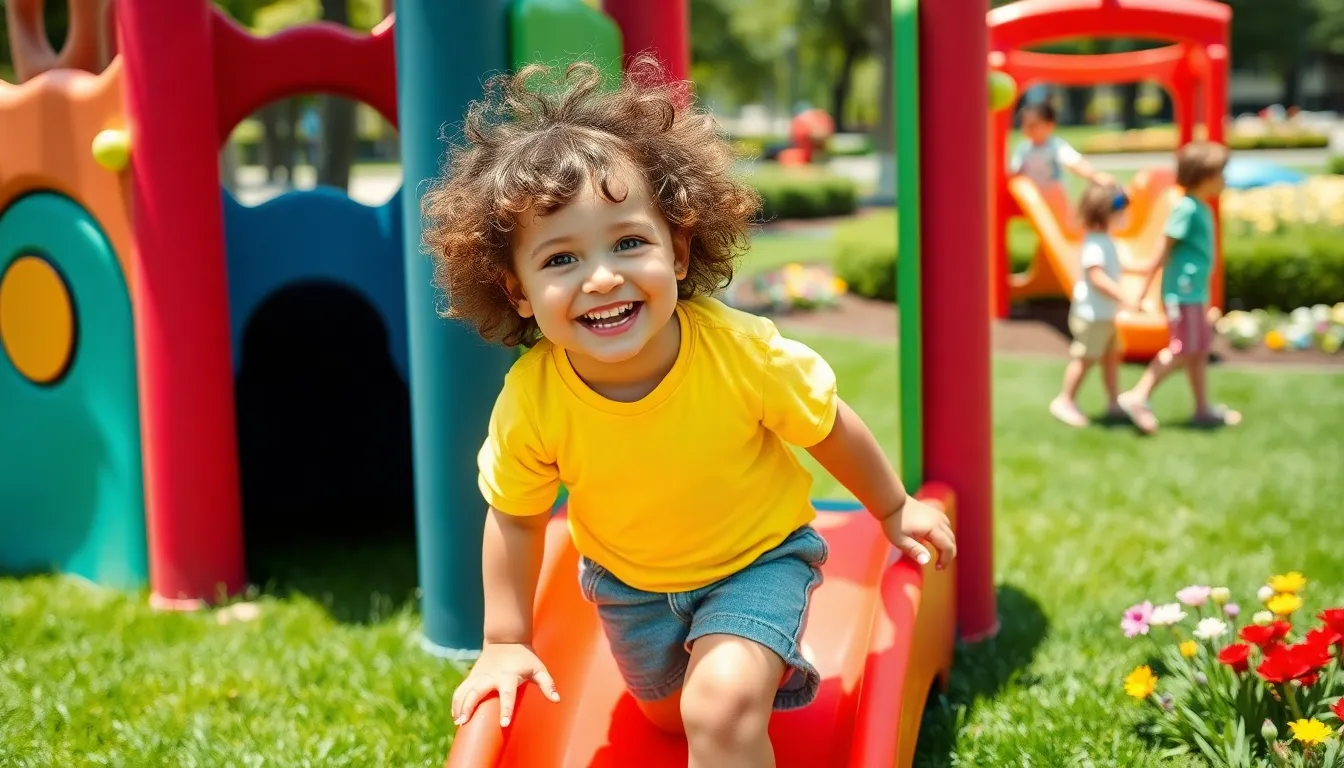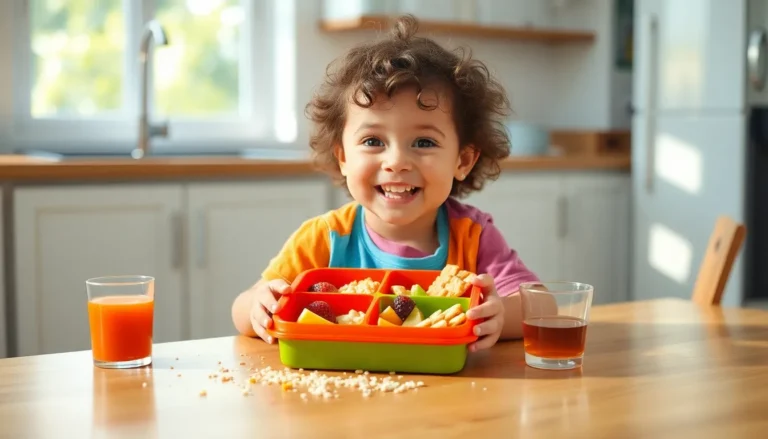Table of Contents
ToggleWhen it comes to toddlers, energy levels can rival that of a caffeinated squirrel. Outdoor play isn’t just a way to burn off that boundless energy; it’s vital for their growth and development. Imagine a world where little ones can explore, climb, and giggle under the sun, all while learning about their surroundings. Sounds like a win-win, right?
Importance Of Outdoor Play For Toddlers
Outdoor play plays a vital role in toddlers’ growth and development. Engaging with nature stimulates curiosity, promotes exploration, and nurtures essential skills.
Physical Development
Physical development significantly benefits from outdoor play. Climbing on playground structures builds strength and coordination. Running and jumping enhance gross motor skills while providing cardiovascular benefits. Engaging in outdoor activities fosters balance, agility, and spatial awareness. Regular physical activity contributes to maintaining a healthy weight and encourages lifelong fitness habits.
Emotional And Social Skills
Emotional and social skills flourish through outdoor play. Interacting with peers during games promotes teamwork and communication. Sharing toys and taking turns helps toddlers develop patience and empathy. Outdoor settings encourage imaginative play, allowing them to express feelings creatively. Over time, these experiences build their confidence, resilience, and ability to cope with challenges.
Types Of Outdoor Play Activities

Outdoor play activities cater to a toddler’s curiosity and energy. Engaging in these activities promotes both enjoyment and essential developmental skills.
Interactive Games
Interactive games thrive in outdoor settings, fostering social interaction. Games like tag and hide and seek encourage toddlers to develop teamwork and communication skills. Creative variations of these games, such as using props or incorporating storytelling, enhance engagement. Incorporating elements like music or movement challenges can keep children captivated. Organized playdates can further facilitate interactions, allowing toddlers to enhance friendships while unpredictably navigating shared space.
Nature Exploration
Nature exploration invites toddlers to observe and learn from their environment. Activities like scavenger hunts immerse children in sensory experiences, enhancing their understanding of nature. Collecting leaves, rocks, or flowers engages toddlers in hands-on learning while promoting curiosity. Outdoor excursions, such as visits to parks or gardens, encourage exploration and discovery. Awareness of local wildlife and plants develops a connection with nature, fostering appreciation for the environment.
Safety Considerations For Outdoor Play
Outdoor play presents many benefits, yet safety remains a priority. Ensuring toddlers have a secure environment enhances their playful experiences.
Supervision Guidelines
Supervision ensures toddlers engage safely in outdoor activities. Parents or caregivers should stay within arm’s reach during high-energy play. Frequent checks for hazards, like sharp objects or uneven surfaces, keep everyone safe. Group play necessitates adult monitoring to guide interactions and prevent conflicts. Establishing a safe play area for various activities minimizes risks while allowing freedom to explore.
Appropriate Gear
Appropriate gear plays a crucial role in safe outdoor play. Clothing suited for the weather, like breathable fabrics in warm conditions, helps toddlers stay comfortable. Sturdy shoes prevent slips and falls, providing necessary support for active play. Sun protection, such as hats and sunscreen, safeguards delicate skin during outside play. In colder months, layering clothing ensures adequate warmth without restricting movement.
Benefits Of Regular Outdoor Play
Regular outdoor play offers numerous advantages that support toddlers’ growth and development. Engaging with nature plays a vital role in overall well-being.
Health Advantages
Outdoor play significantly boosts toddlers’ physical health. Activities like running, climbing, and jumping improve strength, coordination, and gross motor skills. These pursuits not only enhance cardiovascular health but also contribute to healthy weight management. Fresh air and sunlight provide essential vitamin D, promoting bone health and immune function. Toddlers who partake in outdoor play demonstrate lower stress levels and improved mood. Physical activity fosters better sleep patterns, contributing to their energy and focus during the day. Simply put, outdoor play lays a solid foundation for a healthier lifestyle.
Cognitive Development
Cognitive growth flourishes during outdoor play. Exploring nature stimulates curiosity and promotes problem-solving skills. Interacting with peers enhances language development and communication, resulting in better social skills. Outdoor play encourages imaginative play that fosters creativity, enabling toddlers to construct narratives and scenarios. Navigating different environments aids in understanding spatial awareness. Engaging in sensory experiences during outdoor activities sharpens observation skills, leading to improved attention spans. In essence, outdoor play provides a rich context for toddlers to learn and thrive intellectually.
Encouraging Outdoor Play
Encouraging outdoor play allows toddlers to thrive and grow through exploration and socialization. Providing stimulating environments enhances their experiences.
Creating Engaging Spaces
Creating engaging spaces encourages active play. Designated areas with grass, sand, or mulch promote safe and fun activities. Incorporating play structures, such as slides and climbing frames, helps children build strength and coordination. Adding sensory elements like water tables or textured paths fuels curiosity and exploration. A balance of open spaces and interactive features ensures toddlers remain engaged and stimulated while discovering their environment.
Setting Up Playdates
Setting up playdates fosters social skills through interaction. Organizing gatherings with diverse activities encourages teamwork and communication among toddlers. Choosing a local park or backyard offers ample space for running and playing. Involving parents or caregivers in these playdates creates a supportive atmosphere for supervising interactions. Planning structured games like tag or scavenger hunts ensures everyone participates and enjoys the experience. Regular playdates help toddlers form friendships and learn important social cues.
Outdoor play is essential for toddlers’ holistic development. It provides opportunities for physical activity that strengthens their bodies and enhances coordination. Engaging with peers fosters social skills and emotional growth, while exploration nurtures creativity and curiosity.
Creating safe and stimulating outdoor environments encourages children to thrive and learn. By incorporating various activities and playdates, caregivers can support their toddlers’ development in a fun and engaging way. Prioritizing outdoor play not only enriches their childhood experiences but also lays a strong foundation for a healthy and active lifestyle. Embracing the outdoors can lead to lifelong benefits for young children.




